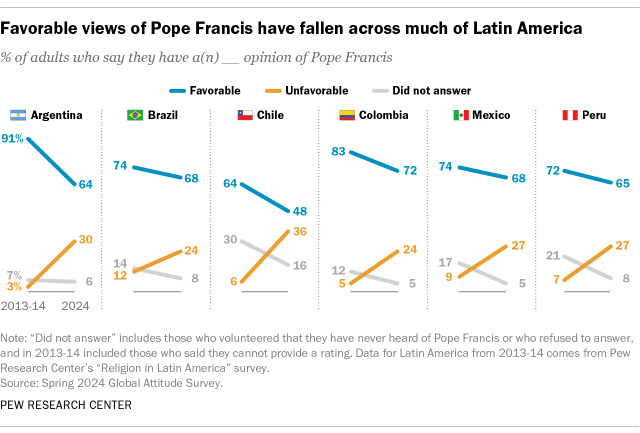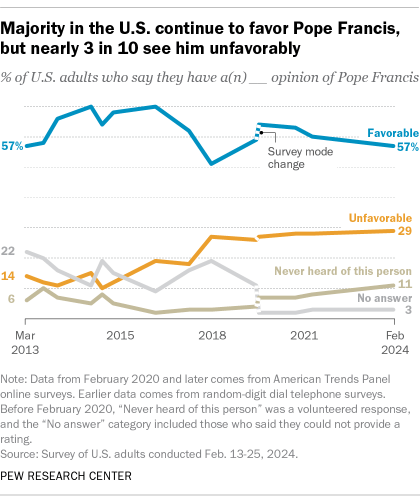(ZENIT News / Roma, 10.13.2024).- A decade after his election as Pope Francis, once a highly popular figure across Latin America, is now seeing a decline in his favorability among the public in the region, according to a recent 2024 survey conducted by the Pew Research Center. The poll, which gathered data from Argentina, Brazil, Chile, Colombia, Mexico, and Peru, highlights both waning support and growing criticism of the Argentine-born pontiff.

Brazil and Mexico Still Warm, But Cooling Off
In two of the region’s largest Catholic countries, Brazil and Mexico, Pope Francis remains relatively popular, with 68% of adults expressing a favorable opinion of him. However, these figures represent a decrease when compared to the initial waves of enthusiasm that accompanied his early years as pope. This trend of declining support is consistent across the region, where positive opinions have diminished notably over the past decade.
Chile’s Divided Reception
Chile stands out for its ambivalence toward Francis. Only half of the Chilean respondents view the Pope favorably, with 48% expressing positive opinions and 36% holding negative views. Although favorable opinions still outweigh unfavorable ones, Chile’s lukewarm reception of the Pope is notable compared to other Latin American nations.
A Significant Decline in Argentina
The most striking shift comes from Francis’ homeland, Argentina. Once revered by 91% of Argentinians in 2013-2014, that number has plummeted to 64% in 2024. This steep decline suggests that even in his birthplace, the Pope’s once-strong bond with the public has significantly eroded, reflecting broader dissatisfaction or disconnect with his leadership.
More Criticism, Less Neutrality
Across Latin America, two major changes in public opinion have emerged since the beginning of Francis’ papacy: an increase in unfavorable views and a reduction in those who remain neutral or unaware of him. In Mexico, for example, the proportion of adults expressing a negative view of the Pope has tripled since 2013 (27% compared to 9%). Meanwhile, the number of people who are either unfamiliar with the Pope or unsure about their opinion has significantly declined, as Francis’ global presence has become more entrenched.
Catholics vs. Protestants: A Growing Gap
Despite the general decline, Latin American Catholics still view Pope Francis more favorably than other religious groups, such as Protestants or the religiously unaffiliated. However, the proportion of Catholics with a positive view is also decreasing. The Pope’s initial popularity across denominations is narrowing, with Protestant and non-religious adults increasingly skeptical of his leadership.
Stable But Shifting Support in the United States
In the U.S., Pope Francis maintains a 57% favorability rating among adults—similar to the numbers recorded in 2013. His approval peaked in 2015 and 2017 when 70% of Americans viewed him positively, but his standing has declined in recent years.

The trends seen in Latin America are mirrored in the U.S., where unfavorable opinions of the Pope have nearly doubled since 2018. Additionally, fewer people report not having heard of the Pope or being uncertain about him, indicating that the American public is increasingly polarized in its views of the pontiff.
Religious affiliation continues to play a role in these opinions. Catholics in the U.S. (75%) are far more likely to have a favorable view of Pope Francis than Protestants (51%) or those without any religious affiliation (56%).
What’s Behind the Shifts?
While the Pew Research Center’s report does not delve deeply into the causes behind these shifts, the data reflects evolving attitudes toward the Pope as his leadership confronts global challenges and divisive issues. Some of the decline may stem from the Pope’s stances on controversial topics, such as climate change, migration, and social justice, which have drawn both praise and criticism. In regions like Latin America, where Catholicism is deeply intertwined with culture and politics, shifts in public sentiment toward religious figures can be influenced by broader social and economic factors.
Despite these fluctuations, Pope Francis continues to be a globally significant moral and spiritual leader. However, the drop in his favorability suggests that the once-broad wave of enthusiasm that greeted his papacy has given way to more nuanced, and at times critical, perspectives on his role and influence.
As the world watches the next phases of his papacy, it will be telling to see whether this downward trend continues or if the Pope can rekindle the warmth he once enjoyed in the region that has long been the heartland of Catholicism.
Thank you for reading our content. If you would like to receive ZENIT’s daily e-mail news, you can subscribe for free through this link.



